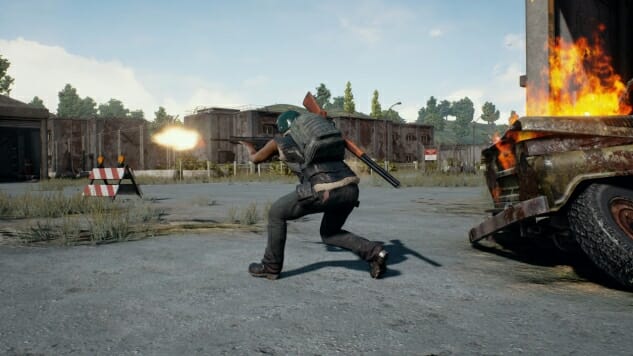PlayerUnknown’s Battlegrounds continues its seemingly relentless march toward massive commercial and popular success with its 1.0 release. Among other things, it just launched on a console (the Xbox One) and debuted its first fully designed map from the ground up. If it wasn’t for Fortnite: Battle Royale, it would mark a genre first on the non-PC market.
It’s a landmark achievement for the game, which has gone from a small modding project on DayZ to the most popular multiplayer game on Steam. It feels indominable, the ultimate battle royale experience stripped down to its most basic fundamentals. Land on island, find gun, shoot everyone you see. Try not to die.
Battlegrounds’ rise to prominence in 2017 came alongside the continuing rise of esports as a popular gaming medium. Historically, the rise and fall of esports is a cycle that has been repeated a number of times since the early 2000s, with various games taking center stage over the years. This current crop of esports hype feels different for one major reason: large development studios are finally smelling the money.
No longer are esports competitions solely fan-run: Blizzard launched its experimental Overwatch League in 2017, and now boasts twelve teams across the world. League Of Legends and DOTA 2 championships are shown on ESPN with the participation of Riot and Valve. From big budget shooters like Call of Duty to freemium mobile games like Clash Royale, publishers are pushing esports to a level never before seen in the industry. It’s big money now.
Esports games, broadly and traditionally, rely on symmetrical and balanced game design. Symmetrical, in that all players have access to the same possible toolset; and balanced, in that no particular toolset is the “best” in every single matchup. Almost all esports or large-scale competitive games are known for this, with endless debates online about which characters are overly powerful, forum threads bursting at the seams with arguments about “buffing” and “nerfing” weaponry or tools to achieve the halcyon goal of “perfect balance”. A game where skill is the only differentiator between participants is both the aim and the bane of “balanced” competitive game design.
The funny thing about this ideal is that in many ways, Battlegrounds succeeds at embodying this. Every participant has the same exact movement speed, armor, and weaponry capabilities. To the untrained eye or the unfamiliar, Battlegrounds would appear to be a perfect competitive esports title. But the game in practice is far different, and this might not be such a bad thing.
I would posit that the game doesn’t really have a place in esports, but the reasons that it doesn’t are intrinsic to the game’s design. Battlegrounds exists as a game that lives and dies by randomness. It’s a great streaming or Let’s Play title for exactly this reason, each game’s outcome being a grab-bag that is influenced by, but not always determined by, the skill of the player. Sometimes you get good drops, sometimes you don’t get good drops.
Battlegrounds is not balanced, and it’s certainly not symmetrical. Weapons, arcade-like, have specific damage outputs that make certain variants simply better than their counterparts. The map design and freeform entrance points via parachute mean that any particular game could play out wildly differently than another. The random loot distribution means that even a player with horrendous skill at aiming and shooting could luck out with the best armor and weapons available, or a great marksman could find themselves marooned in the desert with only a revolver.
These scenarios make the highs and lows of Battlegrounds that much more extreme, but don’t lend themselves to the more expected ebbs and flows from game to game that are seen in the championship circuits of Overwatch or League of Legends. A star player in Battlegrounds likely still has many games that are non-starters, killed just after landing or games spent scrounging the landscape in futility until being picked off from afar.
For a designer who wishes to have an orderly procession of generally understandable game-flow, with player skill determining who ends up on top of every match, PUBG is an unequivocable disaster scenario—the polar opposite of the attempted grace and balance of a DOTA or League of Legends match.
It’s also fun as hell.
And more importantly, it wouldn’t be the same if the attention toward balance that a game like Overwatch has were to be applied to the more chaotic design elements of Battlegrounds. The strength of the game relies on its non-adherence to traditional “esports” design pillars. At no point does skill guarantee a win on the fields of Erangel or Miramar—it’s just another item that could help you on your path toward that sweet chicken dinner.
Making Battlegrounds more “balanced” would rob it of its most powerful and interesting design quirks, and ultimately would spell doom for the game. It’s far from a perfectly designed game, but it’s a great example of how large-scale multiplayer games can survive, and even thrive, without adhering strictly to the gospel of balance. In Battlegrounds, anything can happen, which flies in the face of what makes a good esports game. That’s also what makes Battlegrounds fascinating.
Dante Douglas is a writer, poet and game developer. You can find him on Twitter at @videodante.
